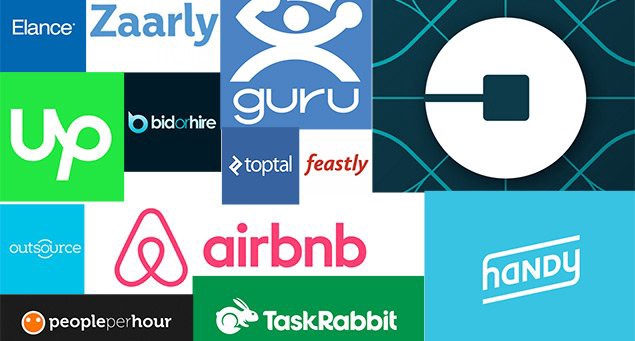
Could The Gig Economy Signify the End of 9–5 As We Know It?
Uber, Lyft, Task Rabbit, Fiverr, Upwork and the list goes on of the several companies popping up daily in hopes of becoming a power player in the newest shift of the American job market, the gig economy.
First introduced in the early 2000s, the gig economy consists of temporary positions and contracts with freelance workers who are only subjected to work for a short period of time. Fiverr, one of the power players in the gig economy that allows users to buy and sell creative services for $5.00 explains that their gig economy is a network for the lean entrepreneur (better known as an entrepreneur who has a big budget dream with little budget money).
According to a study conducted by Intuit, by 2020 approximately 40 percentof American workers will be a part of the growing gig economy. This can be mainly attributed to the growing number of jobs that can be done anywhere a computer is located. This gives employees a variety of different jobs and projects from across the world to choose from while also giving employers a larger pool of candidates to select without being confined to one location.
Why The Gig Economy and Why Now?
The gig economy couldn’t come at a better time especially for the United States Secretary of Treasury, Steven Mnuchin who recently echoed the words of President Trump notating that the unemployment statistics that are being reported are inaccurate. The unemployment rate over the last several years has actually increased; however, the Bureau of Labor Statistics unemployment statistics only take into consideration individuals who do not have a job and have actively looked for a job within the past four weeks of losing one. It does not include those who have given up on their job search entirely.
Because of this estimated 20% unemployment rate, the gig economy is becoming more important now than ever to families who have looked to make a little extra money while they are waiting for a full time job to give them a call. It has become the saving grace for families across the country who at one point would have resorted to government assistance but now have an option of making quick cash legally.
Additionally, the gig economy has helped businesses save thousands of dollars in resources by allowing companies to decrease office space and eliminate the need for training. This also gives companies the ability to work with subject matter experts on a contractual basis who may otherwise be too expensive to hire full time. The gig economy allows the freelancer to gain work life balance while allowing the employer the chance to not have to worry about constantly hiring and rehiring millennial workers who’s average job life span is no longer than 3 years.
The Biggest Winners and Losers in The Gig Economy
When it comes to the biggest winners and losers in the gig economy, the answer is pretty clear cut. If you are an employee who has a skill set or expertise in an area that is in demand you’re guaranteed to survive this transition from a traditional 9–5 to a freelance lifestyle. These workers have skill sets that include technical, management, leadership or creative abilities.
Those who have entrepreneurial spirits also win big. The gig economy is designed for hustlers to thrive. Workers who sit back and wait for opportunity to come to them will easily be weeded out of the equation while workers who are go getters and willing to go the extra mile to increase their income streams will thrive on multiple levels.
How To Thrive in The Gig Economy?
So you want to know how you can thrive in the gig economy? It’s quite simple. Be persistent and be willing to evolve. The more you evolve as a worker, the more opportunities you will inevitably open yourself up to and you will begin to see the possibilities will be endless. For several centuries it has been embedded into our brains that the only way we can be successful in careers is by obtaining a certain level of education and experience; however, in this new gig economy education means nothing but skill set means everything.
How do you think the gig economy will impact your America? Leave your comments below.
